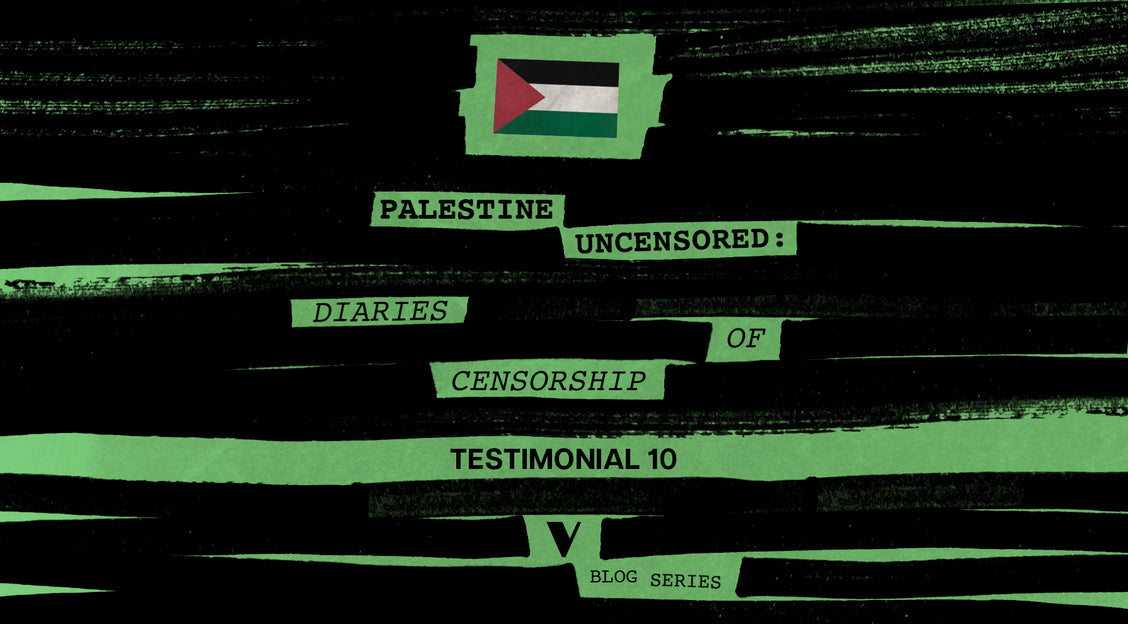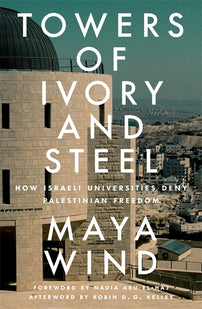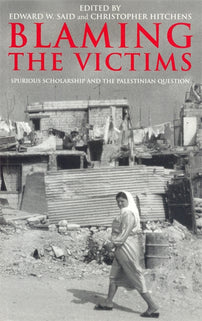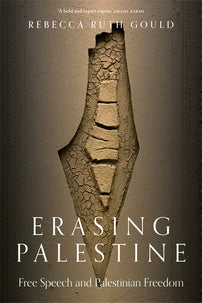Notes of Censorship and Solidarity with Palestine: Testimonial 10
Since launching our Palestine Uncensored series, we've received an influx of submissions documenting instances of censorship and retribution for supporting Palestine, as well as inspiring demonstrations of solidarity. Here, we share a collection of these stories from across the world.

From Chris Manor, unionized electrician:
I am a union worker and currently work at a county-run theater as the department head electrician. I put up a Palestinian flag in my lighting booth to show solidarity with the people being relentlessly murdered by the genocidal policies of the State of Israel. As a wage worker, my taxes finance the bombs being dropped indiscriminately by the State of Israel on civilian targets in the name of self-defense.
I was recently told that my flag was in violation of a county ordinance for displaying flags. This turned out to be false because I was not using a flag standard. Instead, I was told that my flag was violating a neutrality policy, something which can’t be produced in writing. My job was threatened if I refused to comply with this policy.

From the Community in EKA for Palestine:
On October 23, an account in solidarity with Palestine, was created by “a group of students, staff and alumni from the Estonian Academy of Arts (EKA)” with the aim of organizing an art fundraiser and penning an open letter to the governing body of the academy. After the university demanded that the creators of the account remove the school’s name from the handle, the latter was changed to “Community in EKA for Palestine.”
A few hours later, an email was sent to all students and staff, stating that “as a university, the Estonian Academy of Arts is apolitical,” and that “political statements made on behalf of EKA (messages published for or against certain countries) be immediately removed from social media and the public.”
A day later, Estonian news outlet Postimes released an article titled “Palestine is supported on behalf of the Academy of Arts, the school demands that its name be removed.” Freedom, much less the right of artists, art educators and students to openly oppose the genocide in Gaza and Palestine in general, has run up against the brick wall of private ownership of the means of communication and the control by capitalistic greed embedded in cultural and educational institutions.
As an answer to our open letter, the rector’s board wrote a statement to the faculty and students, introduced by the sentence: “Unfortunately, a cruel and bloody conflict has broken out again in the Middle East.” A few days later, a public talk in the premises of the academy titled “The Middle East Conflict” where the entirety of the panel was white Europeans, took place. The attendance was in high numbers but the panel of guests was unabashedly racist and islamophobic, going as far as saying that it’s reasonable to bomb hospitals and using vocabulary that dehumanizes Arabs and Palestinians.
We feel hopeless because the horrific events in Gaza are exposing the social rot in our world, which sadly is a cultural edifice that hinders the open and democratic expression of views at every point. While the academy claims to be “apolitical”, most of its student body produces politically engaged art — the academy has also previously taken a political stance by mobilizing resources in solidarity with Ukraine, integrating scholarships into study programs and waving a symbolic Ukrainian flag in front of the school.
The worldwide struggle against oppression and the defense of the Palestinian people require an end to prejudice about which lives we deem important and the death of the racist white supremacist and capitalist sway over academia and the art world.
From a university professor:
As an American university professor specializing in global justice, I find myself navigating a precarious landscape where the discussion of atrocities against Palestinians is mired in layers of censorship and an unspoken yet palpable pressure towards self-censorship. My academic rigor and commitment to truth impel me to shed light on these issues off campus, yet I'm acutely aware of the boundaries set by institutional and political pressures. My discussions on this issue on campus are with trusted colleagues, and occur at a literal whisper. The plight of Palestinians, a critical human rights issue, often becomes sidelined in educational discourse, overshadowed by the fear of reprisals or professional ostracization. This enforced silence is not just a personal challenge; it is a disturbing trend I've observed among colleagues nationwide. Many who once voiced strong opinions on global injustices, now tread cautiously at best, choosing silence over the potential backlash of speaking out. This helps no one in need.
This widespread reticence among academics is, in my assessment, a direct consequence of the intricate interplay between the U.S. government's policies, the military-industrial complex, and the corporate media's glaringly narrow and skewed framing of these events. The U.S. government's staunch support for Israel creates a formidable barrier against open discourse on Palestinian rights, much less fact-and-law-based discourse. Moreover, the corporate media consistently portrays this conflict in a manner that omits or dilutes the severity of the atrocities committed against Palestinians by Israeli forces, thereby shaping public perception and, by extension, the academic discourse. As a professor of global justice issues, I am beyond troubled by this reality, where the pursuit of truth is consistently at odds with the prevailing political, economic, and media narratives, leading to a deafening silence on critical human rights issues.
If you have a story to share, please send it to pdiaries@verso.co.uk. We are publishing testimonies from all over the world. To see the full collection of testimonials, check out the Palestine Uncensored series' main page.
← Read Testimonial 9 in our Palestine Uncensored series
Read Testimonial 11 in our Palestine Uncensored series →
[book-strip index="1"]


